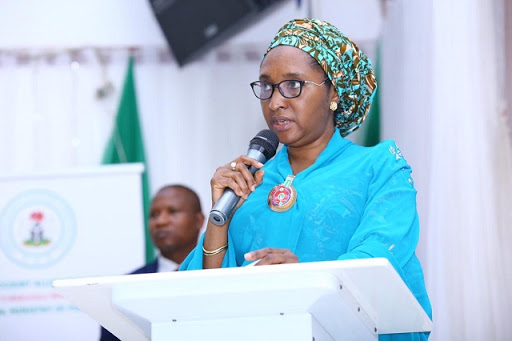Posting of Treasury Officers to MDAs
Out of concern for the country’s dwindling revenue base, the federal government has commenced the posting of personnel on directorate cadre, who it classifies as professional treasury officers, to revenue yielding Federal Government Owned Entities. (FGOEs). This move is ostensibly aimed at boosting their revenue-generating capability. Speaking at the opening ceremony of a three-day orientation […]

Mrs. Zainab Ahmed, Finance Minister
Out of concern for the country’s dwindling revenue base, the federal government has commenced the posting of personnel on directorate cadre, who it classifies as professional treasury officers, to revenue yielding Federal Government Owned Entities. (FGOEs). This move is ostensibly aimed at boosting their revenue-generating capability.
Speaking at the opening ceremony of a three-day orientation exercise for 50 directors so designated for posting, Minister of Finance, Budget and National Planning Zainab Ahmed highlighted the huge potential in revenue generation by the FGOEs.
- We’ll recover unremitted N1.2trn in MDAs – Forensic accountants
- AGF to punish MDAs not submitting audit reports
At the forum, she told the directors that the “Analysis of the budgets of some of the FGOEs shows that these entities have the capacities if properly managed, to significantly improve the revenue base of the federal government. It is in this light that the deployment of the treasury directors is considered expedient to the selected FGOEs as a pilot test.”
She also clarified that the deployment of directors of revenue to the FGOEs was in compliance with a presidential approval conveyed via the Secretary to the Government of the Federation (SGF) dated October 16, 2018. That circular was on the approved Revenue Performance Management Framework for government-owned enterprises. This implies that the plan to deploy such revenue officers is not recent but was articulated as far back as 2018, only to be implemented just recently.
As can be recalled, the issue of diminishing revenue, since the beginning of 2020 and courtesy of the COVID-19 pandemic, has remained a matter of grave concern especially with the alert that the country may be heading to another recession. In the same context, government recently cited the same reason of dwindling revenues to hike electricity tariffs as well as pump price of petrol and is now contending with labour over the threat by the latter to down tools in a massive industrial action that may cripple the government and strain the society.
However, while the posting of treasury officers to the designated MDAs just on the prompting by a contingency such as dwindling revenues looks justified, it also presents the government as acting in a panic with a defective fiscal culture that is inadequate for the times. Ordinarily, the public bureaucracy should have as part of its establishment an effective system-wide fiscal regime which incorporates controls over revenue targets as well as other operational guidelines to ensure integrity in the management of public funds across the country.
The foregoing seems to be absent hence the present measure of posting treasury officers on a situational basis. It is incidental that along with the posting of treasury officers to FGOEs, there is also a review of treasury documents and related instruments. In the circumstance lies the fact that a major restructuring of the fiscal regime of the government is overdue hence the slips in revenue reporting.
In light of the foregoing, the government should not rest on its oars with a false sense of assurance that the mere posting of treasury officers will automatically change the revenue from these agencies. Rather, it should intensify the monitoring of the designated officers to ensure full compliance with their schedule of recording all accruing revenues which hitherto were not captured and remitted. Otherwise, their posting will be the creation of additional comfort zones for them to hibernate in and milk the system dry.
Meanwhile, government should also intensify the deployment of information technology tools as banks and other sectors have done to minimise human error in managing public affairs. By and large Nigerians should look forward to a regime where the common patrimony enjoys credible management by the authorities.
